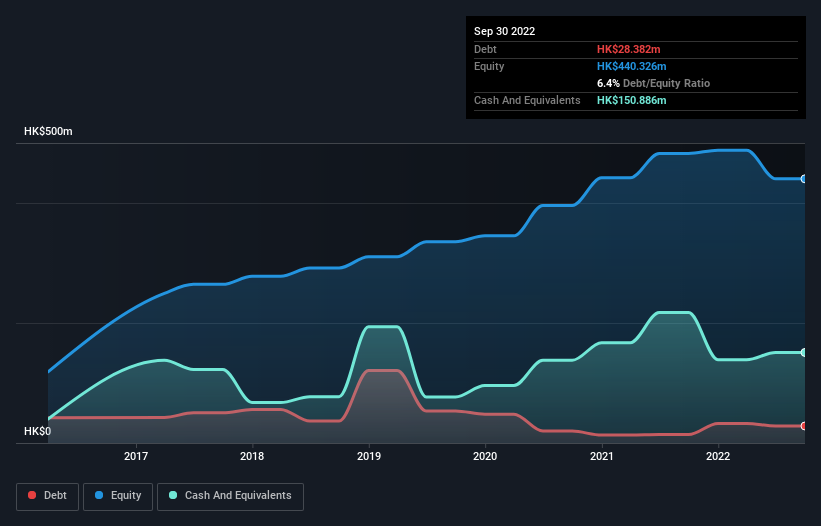- Hong Kong
- /
- Trade Distributors
- /
- SEHK:1660
Is Zhaobangji Properties Holdings (HKG:1660) Weighed On By Its Debt Load?
David Iben put it well when he said, 'Volatility is not a risk we care about. What we care about is avoiding the permanent loss of capital.' So it seems the smart money knows that debt - which is usually involved in bankruptcies - is a very important factor, when you assess how risky a company is. As with many other companies Zhaobangji Properties Holdings Limited (HKG:1660) makes use of debt. But the more important question is: how much risk is that debt creating?
When Is Debt A Problem?
Debt assists a business until the business has trouble paying it off, either with new capital or with free cash flow. If things get really bad, the lenders can take control of the business. However, a more common (but still painful) scenario is that it has to raise new equity capital at a low price, thus permanently diluting shareholders. By replacing dilution, though, debt can be an extremely good tool for businesses that need capital to invest in growth at high rates of return. When we think about a company's use of debt, we first look at cash and debt together.
See our latest analysis for Zhaobangji Properties Holdings
What Is Zhaobangji Properties Holdings's Debt?
The image below, which you can click on for greater detail, shows that at September 2022 Zhaobangji Properties Holdings had debt of HK$28.4m, up from HK$14.0m in one year. However, it does have HK$150.9m in cash offsetting this, leading to net cash of HK$122.5m.

A Look At Zhaobangji Properties Holdings' Liabilities
According to the last reported balance sheet, Zhaobangji Properties Holdings had liabilities of HK$70.7m due within 12 months, and liabilities of HK$45.8m due beyond 12 months. Offsetting this, it had HK$150.9m in cash and HK$98.3m in receivables that were due within 12 months. So it can boast HK$132.7m more liquid assets than total liabilities.
This short term liquidity is a sign that Zhaobangji Properties Holdings could probably pay off its debt with ease, as its balance sheet is far from stretched. Simply put, the fact that Zhaobangji Properties Holdings has more cash than debt is arguably a good indication that it can manage its debt safely. The balance sheet is clearly the area to focus on when you are analysing debt. But it is Zhaobangji Properties Holdings's earnings that will influence how the balance sheet holds up in the future. So if you're keen to discover more about its earnings, it might be worth checking out this graph of its long term earnings trend.
Over 12 months, Zhaobangji Properties Holdings saw its revenue hold pretty steady, and it did not report positive earnings before interest and tax. While that's not too bad, we'd prefer see growth.
So How Risky Is Zhaobangji Properties Holdings?
We have no doubt that loss making companies are, in general, riskier than profitable ones. And the fact is that over the last twelve months Zhaobangji Properties Holdings lost money at the earnings before interest and tax (EBIT) line. Indeed, in that time it burnt through HK$28m of cash and made a loss of HK$30m. Given it only has net cash of HK$122.5m, the company may need to raise more capital if it doesn't reach break-even soon. Overall, its balance sheet doesn't seem overly risky, at the moment, but we're always cautious until we see the positive free cash flow. When we look at a riskier company, we like to check how their profits (or losses) are trending over time. Today, we're providing readers this interactive graph showing how Zhaobangji Properties Holdings's profit, revenue, and operating cashflow have changed over the last few years.
Of course, if you're the type of investor who prefers buying stocks without the burden of debt, then don't hesitate to discover our exclusive list of net cash growth stocks, today.
New: Manage All Your Stock Portfolios in One Place
We've created the ultimate portfolio companion for stock investors, and it's free.
• Connect an unlimited number of Portfolios and see your total in one currency
• Be alerted to new Warning Signs or Risks via email or mobile
• Track the Fair Value of your stocks
Have feedback on this article? Concerned about the content? Get in touch with us directly. Alternatively, email editorial-team (at) simplywallst.com.
This article by Simply Wall St is general in nature. We provide commentary based on historical data and analyst forecasts only using an unbiased methodology and our articles are not intended to be financial advice. It does not constitute a recommendation to buy or sell any stock, and does not take account of your objectives, or your financial situation. We aim to bring you long-term focused analysis driven by fundamental data. Note that our analysis may not factor in the latest price-sensitive company announcements or qualitative material. Simply Wall St has no position in any stocks mentioned.
About SEHK:1660
Seven Elements Investment Holdings
An investment holding company, engages in the trade and lease of machinery and spare parts in Hong Kong and the People’s Republic of China.
Excellent balance sheet with very low risk.
Market Insights
Community Narratives




